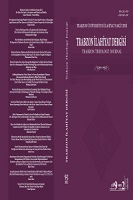Mu‘tezile Kelâmında Ahiret Halleri (Eskatoloji): İbnü’l-Melâhimî Örneği
States of the Hereafter (Eschatology) in Mutazilah Theology: The Example of Ibnu'l-Malâhimî
Author(s): Mehmet Fatih ÖzerolSubject(s): Theology and Religion, Islam studies, Philosophy of Religion, Qur’anic studies
Published by: Karadeniz Teknik Üniversites - İlahiyat Fakültesi
Keywords: Kalâm; Mutazilah; Ibn Al-Malâhimî; Sam’iyyât; The Hereafter;
Summary/Abstract: The events that will occur in the life of the grave which begins with the death of man and in the Hereafter are discussed under the title of sam'iyyât. The principle of sam’iyyât together with the principles of divinity and prophethood is one of the "usûl-i selâse" in the science of kalâm; It covers the subjects of belief in angels and belief in the Hereafter. In the article, the views of Ibn Al-Malâhimî, who is one of the last period Mutazila theologians, about the interrogation in the grave which is the first stage of the Hereafter and the events that a person will experience in the Hereafter will be discussed. It is seen that he adheres to the apparent the religious evidence as a method in understanding the issues of semʻiyyât. In particular, he accepted subjects such as torment in the grave, sırât, and mîzan as they are with their apparent meanings as mentioned in the relevant verses and hadiths. He said that such otherworldly events and concepts should be proved not by observation method, but by religious evidence. Ta’wil, which is accepted as a rational method in Muʿtazilî theology, is also a method that Ibn Al-Malâhimî sometimes resorts to in understanding an avaluating the events and concepts related to the Hereafter. However, he accepted the religious evidence (nas) as the basis for the matters of the Hereafter. In his interpretations on the subjects, he considered the literal meaning of the Qur'anic verses and hadith narrations.
Journal: Trabzon İlahiyat Dergisi
- Issue Year: 9/2022
- Issue No: 2
- Page Range: 208-240
- Page Count: 33
- Language: Turkish

